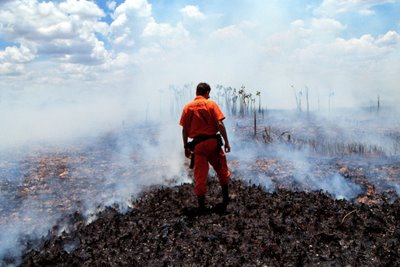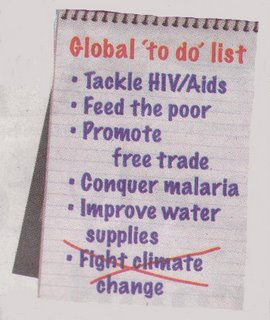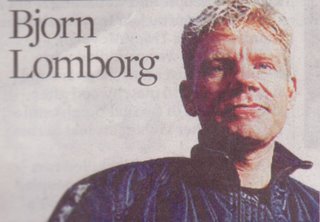Introducing.........'Ecological Economics'
Do we want to consume ourselves to death? (Consumption obesity disorder!)



Thanks to Robert Metcalfe for the following. Check out his blog at http://www.environ-econ.blogspot.com/ .
Consumption in ecological economics.
Entry prepared for the Internet Encyclopedia of Ecological Economics
by Inge Ropke
Department for Manufacturing Engineering and Management
Technical University of Denmark
Denmark
April 2005
Introducing.........'sufficiency';
'The core idea of ecological economics is that the human economy is embedded in nature and that economic processes are simultaneously natural processes in the sense that they can be described as biological, physical and chemical processes. Thus society can be seen as an 'organism' with a 'social metabolism' based on flows of energy and matter, and this organism can take up more or less 'space' in the geo-biosphere of the earth. The greater the size or scale of the human economy, the greater the risk of destroying the conditions for human life on earth in the long run, and as humans will never know the exact limits, margins must be left. The researchers who gathered in ecological economics agreed that the scale of the economy was now so large that nature's basic life support systems for humans are threatened. In other words, there are limits to the material growth of the economy, and these limits have already been reached or exceeded. This is all the more so, since most ecological economists add a consideration for the living conditions of species other than humans.
As the scale of the economy has to be limited in the interest of future generations and in the interest of other species, the global problems of poverty cannot be solved through economic growth. To increase the environmental space for improving the living standards of the poor, the affluent have to reduce their appropriation of natural resources and pollution absorption capacity. Although technological change can be managed in ways that increase the flow of services achieved from a given throughput of energy and matter, such efficiency increases will not be sufficient to meet the challenge. Therefore, the sufficiency revolution has to be accompanied by a sufficiency revolution among the richest fifth of the world population. Accordingly, living standards and consumption had to appear on the agenda of ecological economics.'
Taken from an article by Inge Ropke presented at http://www.ecoeco.org/publica/encyc.htm
The Coffee House - An Environment Forum
There is an increasing amount of news out there, fed to us 24 hours a day. Unfortunately, less and less is 'investigative' journalism looking into the deeper reasons behind why things are happening. At The Coffee House we pick out some of the more controversial news stories for debate. Politics, economics, development and environment are our main focus. Grab a coffee (or tea!) and join us. Just don't be shy!
Monday, July 31, 2006
Sunday, July 30, 2006
The Amazon is a donna...... Photo: destruction of the Amazon for agriculture
Photo: destruction of the Amazon for agriculture
Next time you stumble into a kebab shop after the pub for your chicken donna or, serve up chicken at home for dinner, visualize the wasteland above. Each year an area of the Amazon rainforest equalling the size of Wales or, 20,000 sq. km is razed to the ground. Much of this is for agricultural use and the predominant crop is soyabeans. The main market for these beans is Europe using the port of Liverpool for redistribution. The main end use for the beans is for mixing in as part of chicken feed. Even if you buy organic fed, locally reared chickens you won't escape the fact that your purchase contributes to the destruction of the rainforest.
Last year the Amazon suffered its worst drought on record. Major rivers slowed to a muddy trickle and fish died in their millions. Alarm bells rang throughout the world, as well as in Brazil .....'the Amazon is dieing'. If the Amazon dies so will we as a species. It's that simple. It may take a few generations but it will happen none the less. This is because the Amazon rainforest constitutes half of the world's remaining rainforest cover and serves as a huge sponge soaking up CO2 emissions. This is particularly important as the world continues apace burning up fossil fuels. To do this, as well as speed up the destruction of these carbon sinks is suicidal and plain daft.
The Brazillian Ministry of Environment is seeking international finance in return for protecting the Amazon as an internationally recognized natural asset for the world at large. At the same time they are looking to the world to reduce fossil fuel consumption. It is noted here though that Brazil's main oil company is rapidly investing in overseas oil exploration. These contradictions need to be dealt with by a combined effort from the UNDP and UNEP, protecting rainforests such as the Amazon, its indigenous peoples and funding alternative programmes for wealth creation. More on the Amazon can be found at; http://en.wikipedia.org/wiki/Amazon_rainforest .
Thursday, July 27, 2006
Top 10.

Found this Top 10 list for reducing our impact upon the environment. Some of it is repetitive;
1. Carpool
2. Recycle
3. Turn off lights
4. Regulate thermostat
5. Conserve energy
6. Plant trees
7. Stop burning fossil fuels
8. Conserve water
9. Go solar
10. Zero population growth
Are there adjustments to this Top 10 list that we could make? Please do suggest any point you would like added but remember, you must also suggest which point from the list must subtracted or adjusted. Expect some good input from the flood of OU students visiting us!
Of course you may think that such a Top 10 list is futile and you maybe right however, educating the masses often involves a very focused message and then one builds from there. The Top 10 came from here; http://www.cafepress.com/buy/water+conservation . It appears to be a 'publish your ideas/photos on products (e.g. T-shirts and mugs) type of site. People then have the opportunity to purchase if they wish. Maybe we could aim to do the same thing as this could be a more 'populist' (effective?) way of spreading good environmental practice!
Changes so far
1. Walk, cycle, use public transport & lastly, carpool
2. Reduce, reuse, recycle
3. Reduce useage of lights, heating & gadgets
4. Buy Fairtrade & Organic
5. Buy energy efficient products
6. Protect woodlands & green spaces
7. Reduce useage of fossil fuels
8. Conserve water
9. Use more renewables
10. Buy local, reducing product miles
Tuesday, July 25, 2006
The gadget is god.
Yes folks, here we go again. The government has just published its Energy Review after assuring us it has consulted widely (and listened narrowly!). OK, there are noises about dealing with Nimby-ism during the planning process under the heading, 'renewables' but, let us not forget such a relaxation of planning procedures will also benefit the nuclear industry. We all know no.10 is keen to see a new generation of nuclear power stations and we all know that thus far it looks as though UK gas and oil reserves are running down. How did this happen in 30 odd years? We sold it overseas! I know, not terribly bright in hindsight. Still, there it is and we also all know I suspect, that with the 'gadget is god' culture we currently live in, energy consumption isn't about to drop off anytime soon.
So where does this leave us? We can conserve a lot more energy at source and with end use. This option does get mentioned but never elaborated on because it just ain't sexy (ie. loads-o-money for fatcats). There's the renewables option but we now realize this can't plug the gap alone. We can import gas from unstable regimes hence needing in invest heavily in the military in order to defend supply. Or, ........we can renew the nuclear stock. Maybe we should do all of the above. With nuclear there's the small issue however of the unresolved waste storage problem. Any ideas? Nah, let's follow successive governments on this matter and quietly sweep it under the carpet. Don't mind if it glows!
Difficult for us mere mortals to work this one out really. Hang on a minute, what about a car keys amnesty .........modeled on the recent knives amnesty? What do think? I know, .........you go first. ;-)
Sunday, July 16, 2006
They can't be serious!

The world is in the middle of an energy crisis with oil nearing $80 a barrel and the flashpoints in the Middle East are flaring up once again. Step up the world's leaders at the G8 summit in St. Petersburg. We hold our breath in anticipation that the most powerful people on this planet will rally around to come up with a credible plan to pull us back from the brink. And here it is (drum roll) ;
The 4 point energy saving programme (!)
1. Use more energy saving lightbulbs
2. Stop leaving electrical appliances on standby
3. Manufacturers should produce more energy efficient set-top boxes (for TVs)
4. Motorists should keep their tyres fully inflated
There you have it! That's it. The energy/environment-saving crisis plan.
They have got to be taking the piss.
What do we say; ...........'sack the lot of them.'
Friday, July 07, 2006
 limate Change Can Wait. World Health Can't") he continues his campaign to persuade us that money spent on combating climate change is wasted. Following on from his 1998 best-seller "The Skeptikal Environmentalist", his core message is that we will get much better value from investing in the areas of human health and economic development than in measures aimed at reducing or mitigating the impacts of human-induced climate change. But still missing from his work is any idea that the environment has value in its own right, rather than as a life support system for the human race.
limate Change Can Wait. World Health Can't") he continues his campaign to persuade us that money spent on combating climate change is wasted. Following on from his 1998 best-seller "The Skeptikal Environmentalist", his core message is that we will get much better value from investing in the areas of human health and economic development than in measures aimed at reducing or mitigating the impacts of human-induced climate change. But still missing from his work is any idea that the environment has value in its own right, rather than as a life support system for the human race.For the full text of the Observer article, go to observer.guardian.co.uk
To add your comments to the debate on how to give the planet a $50bn makeover, go to
www.observer.co.uk/blog

Interview With The Dubya
In a ground-breaking interview to mark his 60th birthday, President George W. Bush was quizzed by Larry King of CNN.
His comments on environmental issues were particularly enlightening; here's a snip of the transcript:
KING: Al Gore was on recently on this program and concerning the environment he said, "President Bush and Vice President Cheney have anointed to any key position that has anything to do with climate change special interest spokesmen for the oil companies, coal companies, and this is no secret." How do you respond to that?
G. BUSH: Um.
KING: Have you seen his film?
G. BUSH: No I haven't seen it but I guess politics never stops. We have done a lot to deal with greenhouse gases by advancing new technologies. I campaigned against Al Gore. I said we're going to spend money for clean coal technologies and we're in the process of doing that and one of these days people are going to look back and say, well, thank goodness the Bush administration made these investments because we'll be able to have electricity from coal that won't pollute.
KING: Why do you think he put a bad rap on you?
G. BUSH: I don't know why. Politics, I guess. But we're the ones -- my administration started the hydrogen initiative. Spent over a billion dollars for research in the hopes that we'll be able to power our automobiles by hydrogen, which would be an amazing advance in -- in -- in -- in -- in cleaning the environment. We've done more on ethanol that any administration. We've got a great record and -- but this town is full of politics. People just say what they want to say.
In other words:
- Bush doesn't care enough about the environment to even consider viewing Al Gore's widely acclaimed movie 'An Inconvenient Truth'
- He thinks that investment in 'pie in the sky' alternative technologies like hydrogen is a valid substitute for reducing energy consumption
- He doesn't give a fuck what anyone says about his administration's environmental record.
Read the full transcript of the interview at www.cnn.com
But be quick. CNN say "THIS IS A RUSH TRANSCRIPT. THIS COPY MAY NOT BE IN ITS FINAL FORM AND MAY BE UPDATED".
Why an update might be required, and what form it might take, we can only speculate.




